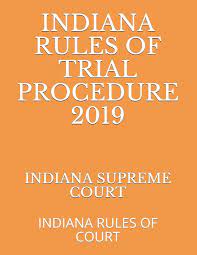The Indiana Rules of Trial Procedure specify the guidelines that all state courts in the state must adhere to. Civil actions are governed by the rules. The regulations are enacted to ensure the state courts operate smoothly and effectively.
What Is the Indiana Rules of Trial Procedure?
The Trial Procedures regulations are the guidelines that control every Indiana courtroom. These regulations uphold the state’s legal system by guaranteeing a just and efficient trial in every civil case. Disparities between the several counties and cities in the state of Indiana are minimized in this way.
In Indiana, a civil lawsuit for a public infraction may be brought either alone or in addition to a court ruling. A party, also referred to as the plaintiff, must file a complaint, pay the required fee, or complete a form waiving the filing fee to begin a civil action. The plaintiff is required to submit their contact details, those of their lawyer, the kind and number of their case, and any pertinent paperwork about the case (such as a Guardian Information Sheet if they are petitioning for guardianship).
The defendant will get a summons from the court clerk upon the filing of this civil action. The type of civil action being pursued, the defendant’s age and state, and the manner of service will all influence the process. The civil action will then proceed to pleading, discovery, and trial court, where, if required, a jury trial will take place. This may be brought before a state court, a small claims court, or the Indiana Supreme Court. A judgment will be rendered following the trial.
Indiana’s trial procedural laws are extremely complex and can be very difficult to understand. Additionally, the civil procedure is often updated with new adjustments to these provisions. The following resources can assist you in understanding the Indiana Rules of Trial Procedure:
Indiana Rules of Trial Procedure
This resource includes the January 2019 amendments to the Indiana Rules of Trial Procedure by the Indiana Supreme Court. This website contains all the information you need to know about Indiana rules, from information on filing a civil action to a judgment and all the stages in between.
If your case involves unique circumstances, you will particularly benefit from this resource. The Indiana Rules of Trial Procedure specify what happens while a case is pending in the Supreme Court, as well as what steps you should take when a trial judge and trial court use trial rule 53.1 to withdraw a civil action. Concerning the Indiana Supreme Court, these processes also address the necessity of calling a special judge.
In Indiana, the first steps in initiating a civil action are filing a complaint or any comparable pleading or document with the court, paying the filing fee or submitting an order waiving the filing fee, and, if service of process is necessary, supplying the clerk with the necessary copies of the summons and complaint. A plaintiff is the one who initiates legal action, and a defendant is the one who is on the other side. The clerk serves a summons to the party or his/her representative following the filing of a complaint. There are several phases to a civil action, which include the following: pleading, discovery, trial, and judgment.
Stages of Trial Procedures
There are various stages to a Trial action, which include:
- Pleading stage
- Discovery stage
- Trial stage
- Judgment stage
Types of Pleadings in Indiana Courts
In Indiana courts, there are various kinds of pleadings, such as:
- Complaint
- Answer to Complaint
- Counterclaim
- Reply to counterclaim
- Cross claim
- Reply to cross-claim
- Third-party complaint
- Third-party reply.
Indiana Rules of Civil Procedure
This site covers Indiana’s regulations, which begin with Rule 4 and conclude with Rule 5. These standards include the details of summonses and subpoenas. This resource might operate as a basic reference if you are unsure of how to proceed with a civil case due to the defendant’s age or current situation. For example, distinct summoning protocols apply to institutionalized individuals, newborns, and incompetents. You may find out exactly what procedures and guidelines the court clerk has to follow to serve a summons or issue a subpoena.
How to Cite Indiana Rules of Trial Procedure
The title of the case, the court of disposition, the volume and page of the regional reporter (or official reporter, if both exist), and the year of the opinion are the required citations for all published Indiana cases. For example, Callender v. State, 193 Ind.
FAQs
What is Indiana Criminal Procedure Rule 4?
A trial must start 180 days after the criminal charge against the defendant is filed, or 180 days after the defendant is arrested on such a charge, whichever comes first if the defendant is being held in jail pending trial.
How do I cite a trial?
The case name, reporter volume, reporter abbreviation, case’s initial page, the particular page containing the cited content, court abbreviation, and date in parenthesis are typically included in case citations (unless the court name is clear from the reporter abbreviation).
How do I cite the Iowa court rules?
When mentioning cases, one must cite the court that issued the decision as well as the volume and page, if available, on which the decision can be located in the National Reporter System. For instance, (Iowa 20_); _ N.W. 2d _ (Iowa Ct.
What is Indiana Rule Number 26?
The court should release an arrested person without monetary bail or a surety if they do not pose a serious risk of fleeing or endangering themselves or others, subject to any limitations and conditions that the court deems necessary, with the following exceptions: (1) The arrestee is accused of murder or treason.
Conclusion
A trial is a forum for resolving disputes through evidence and adjudication by a court or jury. There are two types: jury trials and bench trials. Indiana Rules of Trial Procedure, Rules of Evidence, Indiana Jury Rules, common law, and statutes govern Indiana civil actions. The trial judge is responsible for implementing court rules and administering proceedings to ensure constitutionally adequate resolution. Trial Rule 16 conferences and scheduling orders give the trial court authority over pre-trial and in-court proceedings. Local rules, courtroom customs, and equipment requirements also govern the trial.
Indiana’s trial court balances public access to court proceedings with the right of the State and litigants to confidentiality. The court has wide discretion to control the courtroom and conduct the trial, but abuse of discretion occurs when the decision is erroneous or contrary to the law. Trial court error is subject to the harmless error rule, which disregards errors unless they prejudiced or violated a party’s substantial right. Ind. governs the sequence of events in civil trials in Indiana. Trial Rule 43(D), the Indiana Jury Rules, and Ind. Code 34-36-1. Bench trials begin with opening statements, while jury trials begin with jury selection and instructions. Jurors are to refrain from discussing the case with anybody outside their fellow jurors, engage in contact via technological devices, or speak with parties, attorneys, outside parties, or the media.



